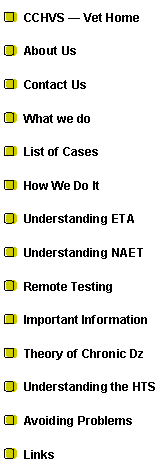





|
$24.95 + S&H for Single books.
20% Discount + S&H with orders of 5 books or more.
30% Discount + S&H with orders of 10 books or more.
Please have Credit Card Handy. We accept Visa, MC & Discover. CA Residents add 8.25% Tax.
OR Call us at: 877-843-6790 or 530-666-7322 |


|
Special interest in chronic or unresolved conditions. |

|
Phone: 530-666-7322 Fax: 530-666-7430 Remote Testing: 530-666-7300 Email: holisticvet@hughes.net |
|
To contact us: |
|
Please bookmark this page so you can return to it easily. |
|
Case Report #11 (Chacho - Seizures)
|

|
At UCD, a pre-op serum panel revealed very high liver enzymes, so the procedure was postponed. The owner reported she had recognized infrequent seizures for about one year(!) , but chose not to treat Chacho, and we did not see him again until, October 28, 1998, for vaccinations and a nail trim. The owner reported that Chacho had been experiencing his seizures at increasing frequencies (they occur daily, now) and allowed us to test him. The complete case report is available on request. The following is a synopsis because intermittent compliance complicated responses. 1. Chacho responded at first during the viral elimination phase. But, due to his response, his owners discontinued testing and treatment prematurely for three years before the seizures started to occur again. 2. Testing and treatment were started again, but once again good response resulted in a six month delay in follow-up testing which was prompted by increasing frequency of seizure episodes. 3. For a third time, failure of compliance accompanied improvement of symptoms. 4. Finally, ten years after initial testing, Chacho’s treatment was follow through and his seizures disappeared and did not return. His owners noticed a corresponding improvement in his behavior. Final note: Chacho’s behavior improvement worked to his disadvantage! He became friendly enough to permit a stranger to abduct him from his fenced front yard in November, 2004. |
|
History: Chacho first came to us at 11 weeks of age to begin a vaccination series. We did not see Chacho again until April 10, 1998 when the owner asked us to neuter him in hopes of altering his aggressive behavior. Because he had a retained testicle which could not be palpated inguinally, we referred him to the University of California School of Veterinary Medicine. |